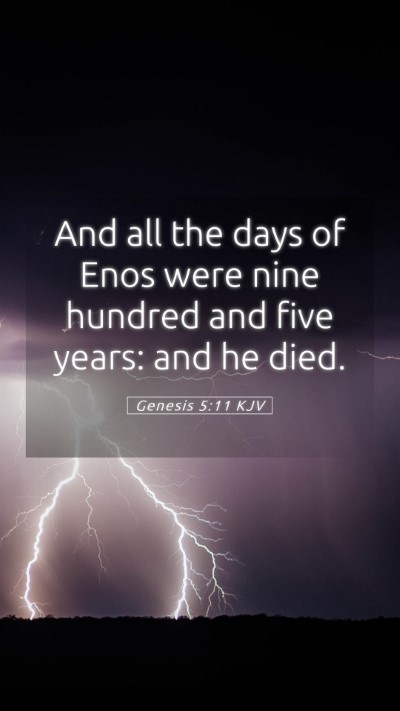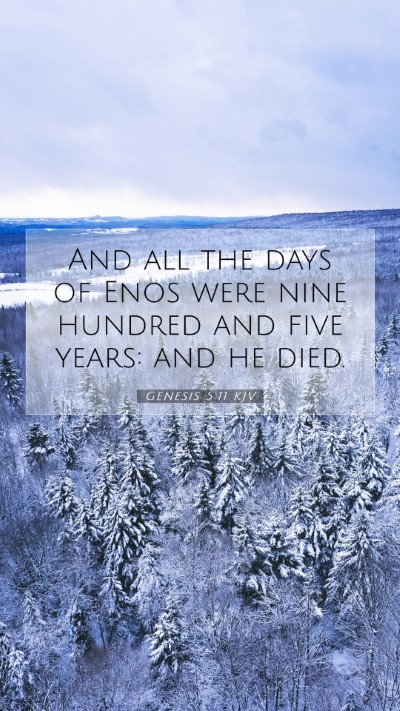Genesis 5:11 - Bible Verse Meaning and Interpretation
The verse Genesis 5:11 reads: "And all the days of Enosh were nine hundred and five years: and he died." This passage provides a succinct yet profound insight into the genealogical record in Genesis, emphasizing both the longevity of the antediluvian patriarchs and the inevitability of death.
Understanding Bible Verse Explanation
Genesis 5:11 encapsulates a remarkable time in biblical history. The genealogies in Genesis often serve multiple purposes: they remind readers of God's ongoing promise, highlight the significance of faithfulness, and illustrate the fallibility of humanity through death.
Historical Context
This verse falls within the genealogical lineage tracing from Adam to Noah, designed to establish the continuity of God's creation and the stark reality of mortality. The patriarch Enosh, as the son of Seth, exemplifies the godly line of humanity. The longevity of those in this genealogy reflects both the blessings and the curse of a fallen world, where despite living centuries, all ultimately succumb to death.
Bible Verse Commentary
- Matthew Henry's Commentary: Henry emphasizes the brevity of life. Enosh's life, despite its length, ultimately concludes with death, reminding us that existence, no matter how long, is accompanied by the shadow of mortality.
- Albert Barnes' Analysis: Barnes highlights the theological implications of death being the great equalizer. No matter how righteous or how long one lives, all are subject to death, reinforcing the message of humanity's need for redemption.
- Adam Clarke's Insights: Clarke draws attention to the character of Enosh, suggesting that his name means “mortal man,” foreshadowing the eventual demise that every man faces, linking mortality to the nature of sin and the curse upon mankind.
Key Themes in Genesis 5:11
- Human Mortality: This verse underscores the reality that death is an intrinsic aspect of life post-Fall, reminding believers of the transient nature of earthly existence.
- God's Sovereignty: The longevity of life speaks to God's overarching plan, reflecting His governance over creation and the appointed time for each individual.
- Continuity of Generations: The genealogy illustrates the faithfulness of God in preserving a remnant through successive generations, leading to the eventual promise of redemption.
Application of Genesis 5:11
Understanding Genesis 5:11 aids in applying its truth to our daily lives. It invites reflection on the significance of our earthly journey in light of eternity. Here are practical applications:
- Recognizing the fleeting nature of life encourages believers to cherish each moment and invest in eternal matters.
- Facing the reality of mortality prompts individuals to seek a deeper relationship with God, who holds the keys to eternal life.
- Understanding the importance of living a legacy of faith, just as the patriarchs did, helps guide believers in their interactions with future generations.
Related Bible Cross References
- Hebrews 9:27: "And as it is appointed unto men once to die, but after this the judgment."
- Romans 5:12: "Wherefore, as by one man sin entered into the world, and death by sin; and so death passed upon all men, for that all have sinned."
- 1 Corinthians 15:22: "For as in Adam all die, even so in Christ shall all be made alive."
Conclusion
The verse Genesis 5:11 serves as a poignant reminder of both the reality of human mortality and the faithfulness of God throughout generations. It invites deeper Bible study insights into the lives of the patriarchs, encouraging believers to seek understanding and apply the lessons drawn from God's Word in their lives.
As you engage with this verse and its meaning, consider utilizing Bible study tools and resources to delve deeper into Scripture, fostering a richer understanding of the themes and truths found within biblical genealogies.


